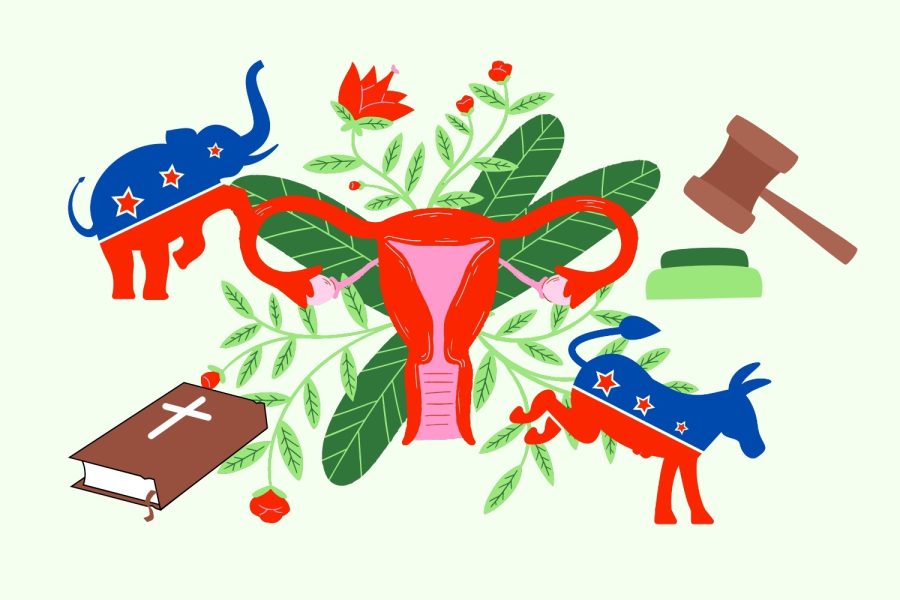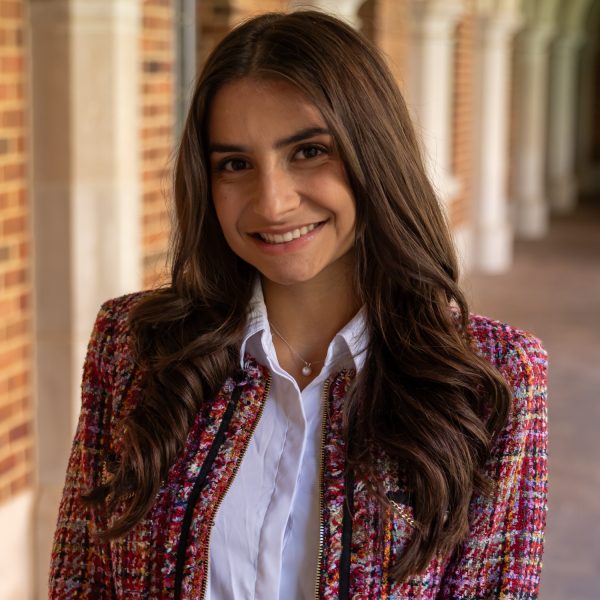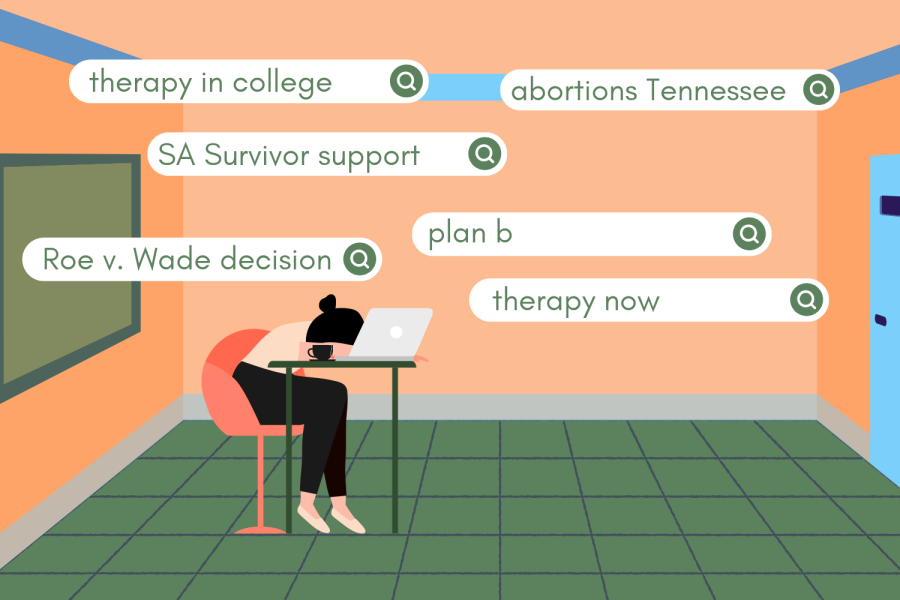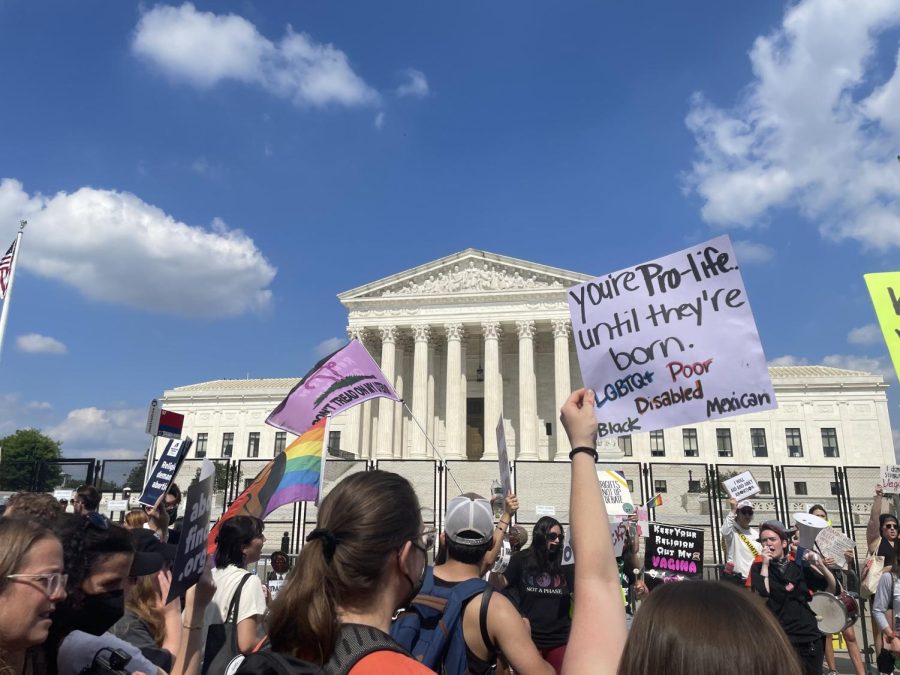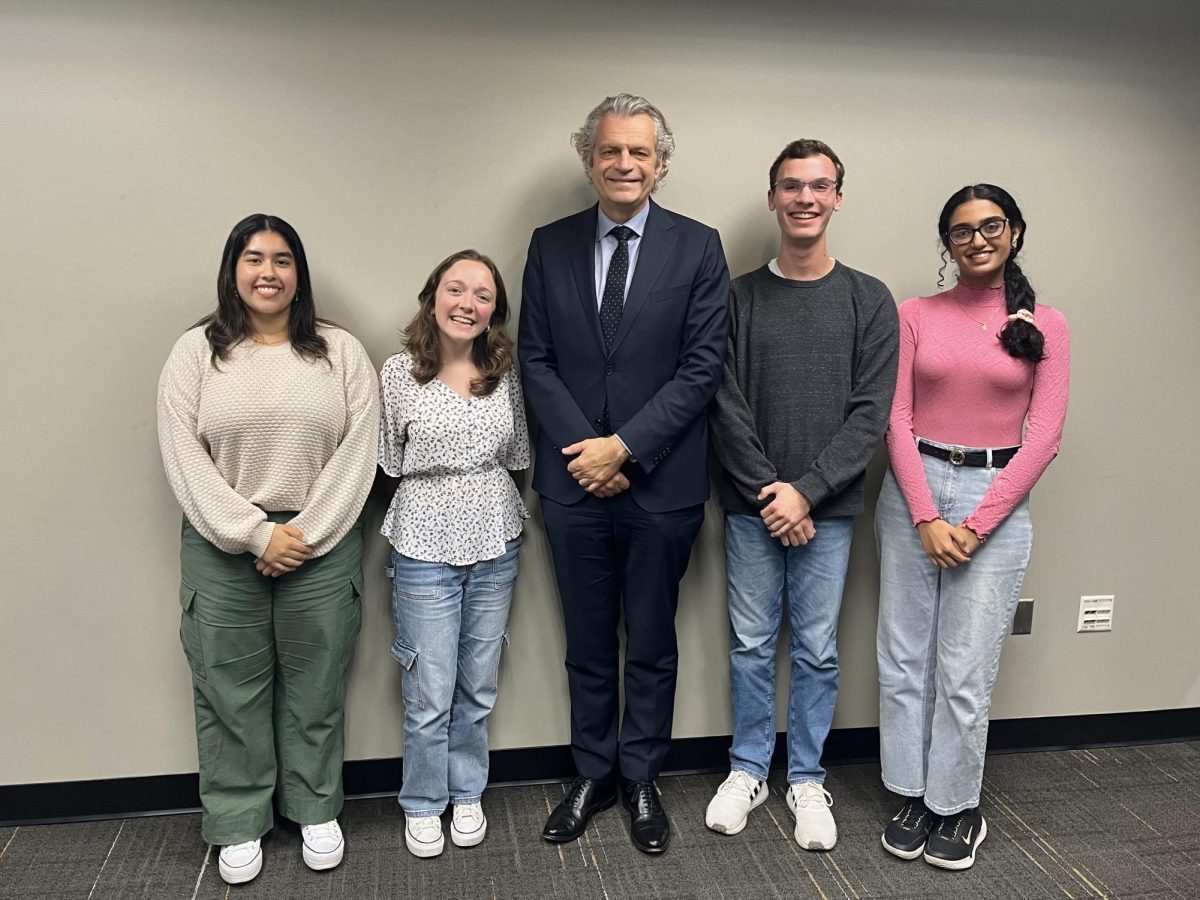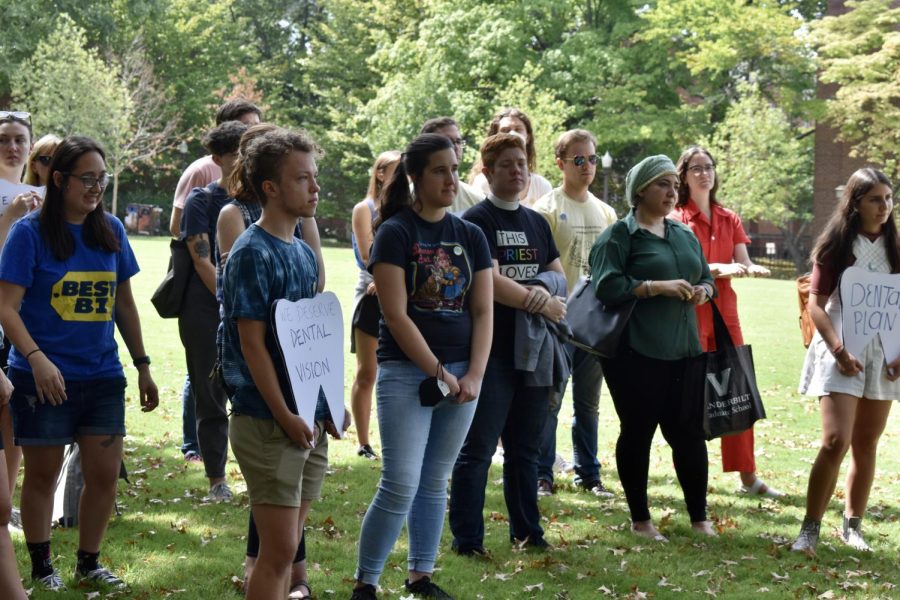Vanderbilt Student Government (VSG) representatives met with Dean of Students G.L. Black on July 18 to propose three initiatives to ensure the rights of student, faculty and staff surrounding reproductive care and abortion access.
The proposals, obtained by The Hustler, call for coverage of out-of-state abortion travel costs, First Amendment protections regarding abortion and student and staff representation on the university’s reproductive rights task force. Black did not respond to The Hustler’s request for comment.
Junior Angela Yan, VSG speaker of the Senate and co-writer of the proposals, said Tennessee’s rapidly changing abortion laws triggered by the overturning of Roe v. Wade (1973) prompted her and fellow student leaders to bring these ideas to the university.
“Vanderbilt’s ultimate goal is to address student needs, and right now there is a huge student need for accessing abortions,” Yan said. “Yes, there are pro-life people who would be angry at Vanderbilt for doing this, but we feel like addressing students’ needs who need this access to essential healthcare would extremely outweigh the cost of maybe causing anger among a minority of the student body.”
Similarly, junior Eleanor Vander Laan, VSG health and wellness chair and co-writer of the proposals, stated that they believe these initiatives reflect VSG’s greater responsibility to react to student needs.
“When things happen in the world or on campus, it’s our job to respond to them,” Vander Laan said.
Members of the task force, professors and leaders of student groups including Women in Government (WiG), Vanderbilt Lambda Association, the Graduate Student Council (GSC) and the Vanderbilt Works Union were consulted in the development of the proposals. A representative of WiG did not respond to The Hustler’s request for comment.
“Seeing as this new ruling has a disproportionately large impact on people of color and minority groups, especially those at a lower socioeconomic status who have even less access to abortions and contraceptives, I wanted to make sure their opinions were being involved in the formation of our proposals,” junior Avani Putcha, VSG sexual assault awareness and prevention chair and co-writer of the proposals, said in a message to The Hustler.
Out-of-state abortion travel fund
VSG requested that Vanderbilt establish an out-of-state abortion fund due to Tennessee’s abortion laws preventing most in-state abortions.
The proposal specifically recommends that Vanderbilt establish a partnership with out-of-state organizations and/or abortion providers to cover out-of-state abortion travel costs. Yan, Vander Laan and junior David Mailman, justice of VSG’s Judicial Court and co-writer of the proposals, explained that this idea is preferable to including abortion-related travel costs in health insurance plans or reimbursing part or all of abortion-related travel costs directly to students, faculty and staff.
“This approach would also add a degree of separation between the task force and people seeking abortions to minimize the risks of breaching HIPAA,” the proposal reads. “Partnering with other abortion providers would also allow all members of the Vanderbilt community to access financial assistance for abortions, regardless of school or private school insurance status.”
Mailman also said providing reproductive healthcare access is a pragmatic and economical decision for Vanderbilt. He highlighted research referenced by an amicus curiae brief filed by 154 economists in support of the defendants in Dobbs v. Jackson Women’s Health Organization (2022).
“Research done [has] shown [that] providing comprehensive health care policies is a good thing for an employer, for an academic institution,” Mailman said.
He added that an out-of-state abortion travel fund could help demonstrate to prospective students and faculty that Vanderbilt is committed to equity.
“If students and faculty on campus are scared that they’re not going to be able to obtain an abortion, how does that bode for prospective students or faculty who get offers from a university in a different state where abortion is legal?” Mailman said. “Unfortunately, Vanderbilt has a history that is tied up in a lot of historical discrimination, disenfranchisement and systemic racism, and it’s a matter of undoing those things and making sure that students, faculty and staff can access abortion care is just one way they [Vanderbilt] are continuing to promise a better future.”
Vander Laan added that they hope Vanderbilt is willing to take a stance on this topic despite the university’s “principle neutrality” regarding other controversial topics and the potential legal and political risks.
“This is hinging on a lot of hope about what the university can actually do,” Vander Laan said. “That risk of the law is why we want to get protection [from] the university.”
Lambda President Lauren Mitchum, also a junior, said the access that this proposal aims to ensure is particularly important and relevant to marginalized groups.
“A lot of students in our community, especially those who hold multiple marginalized identities, do not have the money or support system to receive safe abortion care, so VSG’s proposal for Vanderbilt to cover out of state abortion costs is extremely valuable to LGBTQ+ students,” Mitchum said in a message to The Hustler.
Rutledge echoed Mitchum, stating that funding for out-of-state abortion procedures is especially needed for those who are unable to work remotely and who are of a lower socioeconomic status.
“Many of our members struggle to make ends meet even working multiple jobs, and we look forward to working with the administration to arrive at solutions to provide equitable access for workers who don’t have the relative privilege of working for only one employer and having the option of remote work,” Rutledge said. “It’s something that needs to be dealt with if Vanderbilt wants to be on the right side of history.”
Task force representation
VSG is also advocating for student and staff representation on the university’s task force on reproductive rights. Currently, the task force is composed entirely of faculty members and administrators, a makeup that Vander Laan said excludes the majority of the Vanderbilt community: students.
The proposal calls for at least one undergraduate student, graduate student and non-academic staff member to be added to the task force. It mentions the precedent of student and staff representation on Vanderbilt task forces, such as the Ad Hoc Committee for Spring 2020 Wellness Days and the 2017 Accessibility Task Force.
“We want to make sure that opportunities for input are constant, not curated,” Mailman said.
The proposal also requests more avenues for student and staff communication with the task force, similar to the 2022 Churchwell Chats hosted by the Office of Equity, Diversity and Inclusion.
“We want to have as much student involvement as possible,” Yan said.
Miguel Moravec, GSC president and a third-year graduate student, said GSC leaders have been working with Vice Provost for Graduate Education and Dean of the Graduate School André Christie-Mizell to obtain graduate student representation on the task force. Elizabeth Boyd, director of operations for the graduate school, also said to Moravec in a July 15 email obtained by The Hustler that the task force is organizing “training and participation opportunities” for students.
“Clearly, the University Task Force is going to be the center of gravity for how Vanderbilt responds to the ruling, so we’ve advocated for students to have a seat at that table,” Moravec said in an email to The Hustler. “We’re excited to announce that, coming soon, grad students will have formal opportunities to participate with the task force.”
David Rutledge, assistant business manager of the Southeast Labor District Council and negotiation committee member, stated that the Vanderbilt Works Union is in favor of this initiative.
“We fully support any initiative to include workers—graduate workers, faculty, white- and blue-collar staff alike—in the university’s decision-making processes broadly, as well as on this issue specifically,” Rutledge said.
First Amendment protections
VSG also proposed First Amendment protections specifically regarding abortion, including the right to freely assemble and freely speak. According to the proposal, these safeguards would ensure that students, faculty and staff can disseminate information about abortion care and services, peacefully protest and meet to organize protests and discuss abortion in any capacity.
Mailman said this proposal reflects the university’s efforts and stated commitment to being a facilitator of free speech.
“It’s really easy to be for free speech when no one is telling you to shut up about something,” Mailman said. “It’s a matter of standing up for all of these things [the university] talks about.”
Vander Laan echoed Mailman, specifically referencing Chancellor Daniel Diermeier’s previous statements about Vanderbilt’s role in encouraging freedom of speech.
“We firmly believe that both transformative education and research really thrive in an environment where people can freely explore ideas and have discussions and civil discourse even on various controversial issues,” Diermeier said in a March 7 interview with The Hustler.
The university’s freedom of expression policy in the Student Handbook currently protects First Amendment rights generally; however, it includes provisions that limit the distribution of printed or electronic media and information as well as protests, dissents and demonstrations.
“Freedom of expression extends to all members of the Vanderbilt community, even when that expression directly challenges the beliefs and ideas of another and even when that expression may be deemed disagreeable or possibly even offensive,” the policy reads.
Yan said that having specific First Amendment protections for abortion-related speech and assemblies is important given the potential for future changes in abortion laws in Tennessee. Mitchum also emphasized the necessity of free speech protections on campus.
“Our ability to protest and engage in other forms of grassroots activism on and off campus is really important,” Mitchum said in a message to The Hustler.
The proposal additionally calls for a protestor bail fund to be created to bail out members of the Vanderbilt community in the case that they are arrested while peacefully protesting about abortion.
“We drew inspiration for the bail fund from other schools and prominent companies who have made a similar commitment,” junior Shreya Gupta, VSG diversity and inclusion chair and co-writer of the proposals, said in a message to The Hustler.
Looking ahead
The writers of the proposals stated that they are working with GSC leadership to improve abortion coverage in the student health insurance plan (SHIP). The 2022-23 plan covers 90% of designated-network abortion procedures, 80% of in-network abortion procedures and 60% of out-of-network abortion procedures.
Academic Health Plans and Aetna, Vanderbilt’s health insurance provider, could not respond to The Hustler’s requests for comments due to being under a “gag order” on this topic. A university representative said in an email to The Hustler that this restriction is in place while the task force investigates student and faculty health insurance in relation to abortion. The university told The Hustler that yearly SHIPs are usually released in the spring but could not give a specific date on which the 2023-24 plan will be released.
“The task force is simply still in the process of working through the logistics and sharing anything at this point would be premature,” the representative’s email reads. “That is the extent of it.”
Moravec explained how the Dobbs ruling hits close to home for many graduate students, stating that a larger percentage of graduate students use SHIP than undergraduates due to their demographics. He added that GSC has been working since the Dobbs decision was released to keep students informed about changing abortion policies, particularly concerning SHIP coverage.
“Graduate students are among the most impacted by the SCOTUS ruling,” Moravec said. “We have an active New and Expecting Parents’ Support Group, for example—so having (or not having) children is definitely on our minds.”
Yan said Black shared the proposals with the task force for review and said the July 18 meeting went well. She encouraged students to contact her or Black with additional ideas but declined to offer more information about the meeting. Sophomore Hananeel Morinville, VSG economic inclusivity chair and co-writers of the proposals, was not immediately available to comment.

